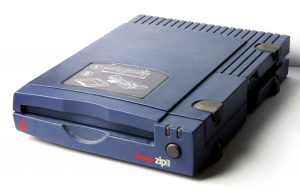You can use balaenaEtcher to raw-write my drive image files to an SD or Compact Flash Card, and some other USB attached storage. When you raw-write a file it doesn’t simply copy the file to the target storage media/device it writes the file bit-by-bit on to the target storage media/device removing all existing formatting.
Leave a CommentTag: Iomega Zip Drive
The 100 MB Zip drive was introduced by Iomega in late 1994, with later versions supporting 250 MB and then 750 MB.
Backwards compatibility:
The 250 MB drive also read and write 100 MB disk.
The 750 MB drive also read and write 250 MB disks, but can only can read 100 MB disks, not write to them.
Interface support:
100 MB Drives: USB 1.1, IDE, SCSI, or Parallel Port interfaces (the Plus supports both SCSI and Parallel)
250 MB Drives: USB 1.1, IDE, SCSI, Parallel Port (IEEE 1284) or Firewire (IEEE 1394).
750 MB Drives: USB 2.0, IDE or Firewire (IEEE 1394).
Iomega Zip: Using a 100MB SCSI Iomega Zip Drive to setup your 68k Macintosh

I’ve recently been experimenting to see if I could somehow use of my old Iomega Zip drives (a 250MB USB version, and a 100MB SCSI) to move files between my Windows PC and my various 68k Macintosh Systems. After a bit of experimentation I discovered how I could not only move files, but also create a disk image that would allow me to use my Windows PC to make fully bootable Zip disks for use with any of the SCSI capable 68k Macintosh systems.
9 CommentsSetting up your vintage (classic) 68k Macintosh
I recently pulled my old Macintosh Color Classic (with an Apple IIe Emulator Card) out of storage in preparation for a move to see if it still works (last used in 2001). so far so good. I also obtained a Macintosh LC475 to setup as my backup system in case the Macintosh Color Classic decides to die on me (need to get a cap job done on both of them).
Because this is a hobby, I often go months at a time when I don’t get to play with these old machines, so I decided to create this site to record the information I found useful, or interesting about my 68k Macintosh systems.
1 Comment